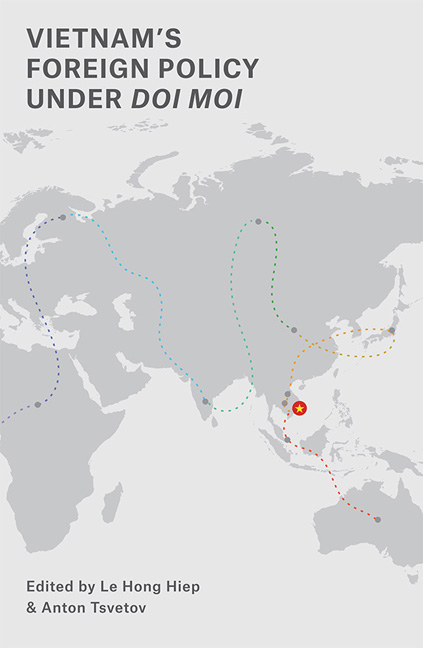Book contents
- Frontmatter
- Contents
- List of Tables
- List of Figures
- List of Abbreviations
- Acknowledgements
- About the Contributors
- PART I ANALYTICAL AND HISTORICAL FRAMEWORK
- PART II BILATERAL RELATIONSHIPS
- 3 The Evolution of Strategic Trust in Vietnam–U.S. Relations
- 4 The 2014 Oil Rig Crisis and its Implications for Vietnam–China Relations
- 5 Vietnam–Japan Relations: Moving beyond Economic Cooperation?
- 6 The Reinvigoration of India–Vietnam Partnership under Prime Minister Modi
- 7 Vietnam–Russia Relations: Glorious Past, Uncertain Future
- 8 Vietnam's Foreign Policy Towards its Smaller Neighbours
- 9 Vietnam's Decision to Join ASEAN: The South China Sea Disputes Connection
- PART III MAJOR FOREIGN POLICY ISSUES
- Index
8 - Vietnam's Foreign Policy Towards its Smaller Neighbours
from PART II - BILATERAL RELATIONSHIPS
Published online by Cambridge University Press: 04 July 2018
- Frontmatter
- Contents
- List of Tables
- List of Figures
- List of Abbreviations
- Acknowledgements
- About the Contributors
- PART I ANALYTICAL AND HISTORICAL FRAMEWORK
- PART II BILATERAL RELATIONSHIPS
- 3 The Evolution of Strategic Trust in Vietnam–U.S. Relations
- 4 The 2014 Oil Rig Crisis and its Implications for Vietnam–China Relations
- 5 Vietnam–Japan Relations: Moving beyond Economic Cooperation?
- 6 The Reinvigoration of India–Vietnam Partnership under Prime Minister Modi
- 7 Vietnam–Russia Relations: Glorious Past, Uncertain Future
- 8 Vietnam's Foreign Policy Towards its Smaller Neighbours
- 9 Vietnam's Decision to Join ASEAN: The South China Sea Disputes Connection
- PART III MAJOR FOREIGN POLICY ISSUES
- Index
Summary
After three decades of Doi Moi (Renovation), Vietnam's role in the region has been remarkably strengthened, particularly after its accession to Association of Southeast Asian Nations (ASEAN) and diplomatic normalization with the United States in 1995. Vietnam's foreign policy has been restructured, readjusted and reoriented in response to the fast-changing global and regional geostrategic and economic landscape. With its growing economic and geopolitical weight, Vietnam is gradually becoming an important strategic actor in Southeast Asia as well as the Asia Pacific.
Available studies on Vietnam's foreign policy mainly focus on Hanoi's relations with the major powers, such as China, the United States, Japan and Russia, and its foreign policy towards regional institutions, especially ASEAN. Few studies have been conducted on Vietnam's relations with its smaller neighbours. To fill the gap, this chapter aims to examine Vietnam's foreign policy towards Cambodia and the Lao People's Democratic Republic under Doi Moi.
The chapter argues that Vietnam is incrementally asserting its leadership role in the Mekong subregion by tightening its traditional ties with the two neighbours through comprehensive engagement with a multi-pronged and multi-layered approach, including strengthening political and security cooperation, economic integration, and socio-cultural exchanges. As long as Vietnam can secure its presence and influence in Cambodia and Laos, its foreign policy, especially its hedging strategy against China, will provide better outcomes with greater returns and fewer risks.
The chapter starts by reviewing Vietnam's foreign policy, objectives and approaches towards Cambodia and Laos within the context of Hanoi's foreign policy reforms and its pursuit of regional integration under Doi Moi. It then analyses the achievements, challenges, and remaining issues in Vietnam's relations with the two neighbours.
Vietnam's Foreign Policy: An Overview
Doi Moi, which was introduced in 1986, marked a critical turning point in Vietnam's foreign policy. The end of the Cold War enabled Vietnam to enlarge its strategic space through the normalization and cementing of ties with all major powers, particularly with China in 1991 and the United States in 1995. Vietnam also gained membership in key regional and global institutions, most notably ASEAN in 1995, Asia-Pacific Economic Cooperation (APEC) in 1998, and World Trade Organization (WTO) in 2007. Vietnam has since adopted a robust regional integration strategy in tandem with its domestic economic reforms and bureaucratic capacity building.
- Type
- Chapter
- Information
- Vietnam's Foreign Policy under Doi Moi , pp. 166 - 185Publisher: ISEAS–Yusof Ishak InstitutePrint publication year: 2018



